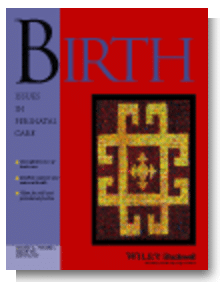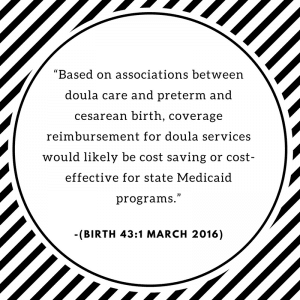By Annie Hill – Senior Advisory Board Member, Madriella Doula Network
 I can’t stop thinking about a quote from the journal article ‘Modeling the Cost-Effectiveness of Doula Care Associated with Reductions in Preterm Birth and Cesarean Delivery‘ that states “women with doula care had 22 percent lower odds of preterm birth.“
I can’t stop thinking about a quote from the journal article ‘Modeling the Cost-Effectiveness of Doula Care Associated with Reductions in Preterm Birth and Cesarean Delivery‘ that states “women with doula care had 22 percent lower odds of preterm birth.“
Forget the brouhaha over Buzzfeed, NYMag and Slate articles that have been besieging our industry right now (other than the fact that they are creating awareness more of what a Doula does – appreciate the lemonade folks) and consider this:
This is a University Study.
The study was done to prove the efficiency of Medicaid coverage of Doulas, as Minnesota is paying for that via Medicaid, and wants to make sure they aren’t wasting taxpayer dollars. As a Birth-worker, and a former single mother (before remarrying this last summer,) I have spent a fair amount of my time studying how to bring in clients so I can get paid – a relevant concern in our economy – balancing a calling, making it a profession, and being financially successful at it while being on solid ethical and moral grounds in the process of it. Due to this research, I’m well aware that Medicaid doesn’t pay any provider that well.
That aside… the study provided solid metrics regarding the value of Doula care to all experiencing pregnancy and birth.
That 22% crosses my mind as I think of that a young mother I am working with right now.
 This young woman has minimal information because the clinic she’s seen in has such a large patient base, she’s in and out rapidly without an understanding of what she has been told by her provider.
This young woman has minimal information because the clinic she’s seen in has such a large patient base, she’s in and out rapidly without an understanding of what she has been told by her provider.
With her prior pregnancy she had no guidance, no one to take the time to say “ok, you were told X, do you understand why you were told this and the ramifications?” It led to an induction and emotional/physical trauma she has had to heal from and carries with her into this following pregnancy.
This pregnancy is important to her that she experiences not only labor starting on its own, but as natural a birth as she can. With Doula assistance she understands better why she needs to eat a higher level of protein, why exercise is critical, and how she can maintain a fluid/electrolyte balance – and with that how she can help her baby grow properly.
Do I believe that I’m her savior with this pregnancy?
No! I am a guide, her sherpa over the mountain of gravidity and into second-time motherhood. All I can do is give her information and help her along the way.
Comparatively, with this pregnancy, she is far more informed and has a greater level of tools she needs in order to actually succeed with a higher level of health for herself and her baby. She feels more empowered to ask questions herself, and that is a win for her.
She’s in a demographic where she’s at risk. This isn’t one of my clients who drives a Lexus, has the McMansion and bears a diamond ring on her left hand that could sink the Titanic… this woman is within the parameters of the U of Minnesota study and her provider is relieved she has a Doula, and has actually ordered encapsulation and consumption of her placenta postpartum. From a financial standpoint, the program proved the value of a Doula.
From an expecting parent perspective? No matter your financial standing, the argument stands that not only is a Doula of value to your health, but to your pocketbook, and that won’t change who’s covering it, whether it’s out of your own wallet, that of the insurer Aetna, Blue Cross Blue Shield, United Healthcare, Coventry, your HSA, your FSA, Medicaid or whomever your insurer is.
When Preterm birth risks are lessened, it means the cost of birth is lessened – both financially and physically. No one wants to see a baby in the NICU, no one wants to see a mother recovering from a preventable cesarean… while having a Doula can’t guarantee that these things won’t happen, having a Doula supported pregnancy, and birth is documented as being a large risk reducer.
I’m proud to be associated with that. As a Doula I hope that you are too.
